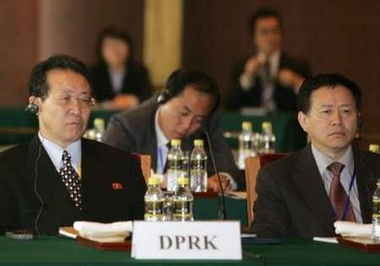|
US rejects North Korea's disarmament idea
(AFP)
Updated: 2005-11-10 09:36 The US assistant secretary of state pointed out that a nuclear reactor, which
could produce weapons-grade plutonium, had continued to operate even after the
basic agreement. "In a sense, the problem got worse since September 19."
South Korea, Japan and China proposed discussions in three categories to move
the talks forward. But the United States was skeptical.
"We don't want to get into protracted discussions on who takes what steps
first and how we calibrate each step," Hill said, adding that the six nations
should rather "sort out things boldly about how we can make some important steps
forward."
South Korea's chief delegate Song Min-soon said he proposed to put the
implementation plan into three categories -- "the dismantling of North Korea's
nuclear program, the economic cooperation and energy aid for North Korea and the
normalization of relations between the countries concerned."

North Korean chief negotiator Kim Kye-gwan (L)
and a member of his delegation listen to opening remarks at the latest
round of six-party talks at Diaoyutai State Guest House in Beijing,
November 9, 2005. [Reuters] | Japan further said
the talks should be broken down into working-level groups to discuss the three
categories. It was unclear if North Korea would accept the proposals.
"North Korea did not single out the issues one-by-one but came up with a
rudimentary opinion about the issue of a light-water nuclear reactor and the
process of dismantling the nuclear program," Song said.
North Korea insisted immediately after the September accord that it would not
disarm unless the United States first supplied it with a light-water nuclear
reactor to generate electricity.
Hill maintained his nation's policy Wednesday that the North must first
rejoin the Nuclear Non-Proliferation Treaty (NPT) and accept inspections by the
UN International Atomic Energy Agency (IAEA).
North Korea has adopted a typically angry stance on the eve of the meeting by
claiming Bush had slandered its leader Kim Jong-Il this week as a "tyrant."
"What he uttered is a blatant violation of the spirit of the joint statement
of the six-party talks which calls for 'respect for sovereignty' and 'peaceful
co-existence,'" a North Korean foreign ministry spokesman said.
The nuclear crisis flared in October 2002 after the United States accused
North Korea of running a secret uranium-enrichment program. The North responded
by throwing out weapons inspectors and leaving the NPT.
On day two of the talks due to last three days, a plenary session is
scheduled to begin at 10:00 am (0200 GMT), South Korea's Song said. The second
phase of the fifth round of talks is due to be held in
December.
|